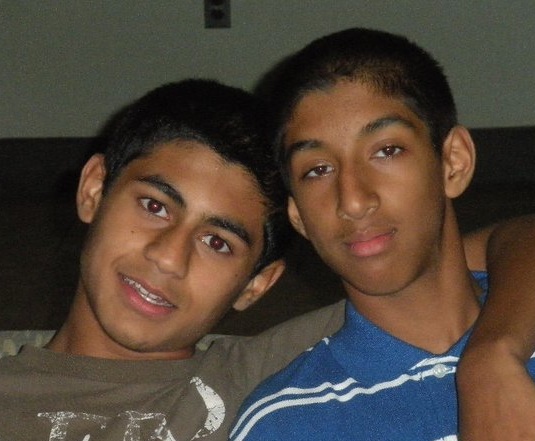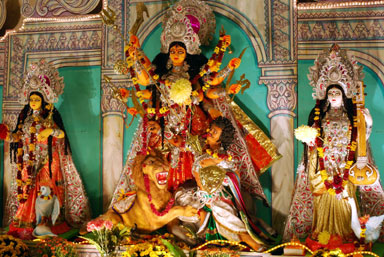 When we celebrate Durga Puja in this adopted homeland of ours, one thought keeps on playing in our minds – how much does our children enjoy this festival? Do they feel the same as we did when we were kids in our homeland? Many of us had the idea that our children really don’t care much about this favorite festival of ours. Often we have seen bored kids playing hand held video games in the hallways of our festival venue while their parents enjoyed inside. We sometimes debated, whether we are forcing our kids to come to the festival just because we want to, or it is our duty as a parent to introduce them to our culture and traditions? Is it working? Can they feel the spirit of the best festival of our community?
When we celebrate Durga Puja in this adopted homeland of ours, one thought keeps on playing in our minds – how much does our children enjoy this festival? Do they feel the same as we did when we were kids in our homeland? Many of us had the idea that our children really don’t care much about this favorite festival of ours. Often we have seen bored kids playing hand held video games in the hallways of our festival venue while their parents enjoyed inside. We sometimes debated, whether we are forcing our kids to come to the festival just because we want to, or it is our duty as a parent to introduce them to our culture and traditions? Is it working? Can they feel the spirit of the best festival of our community?
To get a more definitive answer, I asked my fourteen year old son Omkar and his friends a simple question. What does Durga Puja mean to them? And here are their responses. Continue reading
Monthly Archives: September 2011
Durga Puja 2011 : New Jersey Style
It is said that you can take a Bengali out of Bengal, but you cannot take Bengal  out of a Bengali. I’d rather rephrase it by saying that you can never take Durga Puja out of a Bengali. The greatest Bengali festival is once again knocking on our doors and the New Jersey Bengalis are gearing up to greet their Mother Durga with utmost fervor. Although according to the Bengali calender the puja starts (Maha Shasthi) on Sunday October 2, the enthusiastic New Jersey Bengalis are not willing to wait that long. ICC of Garden State will start their festival on Saturday 24th September and continue till Sunday the 25th. The Puja will be held at the Mt Olive High School, 18 Corey Rd, Flanders, NJ 07836. They have also lined up an impressive cultural program featuring the famous Bengali singer Nachiketa (more on Nachiketa later), a Bengali play from Toronto, and Soumen Adhikari, another singer from Kolkata. Several other local programs and great food also awaits the attendees. Note: I just learnt that ICC has canceled Nachiketa’s program due to lack of timely confirmation from the artist’s agent. Instead, they will be presenting Nirmalya Ray, a well known artist to the NJ music lovers. Continue reading
out of a Bengali. I’d rather rephrase it by saying that you can never take Durga Puja out of a Bengali. The greatest Bengali festival is once again knocking on our doors and the New Jersey Bengalis are gearing up to greet their Mother Durga with utmost fervor. Although according to the Bengali calender the puja starts (Maha Shasthi) on Sunday October 2, the enthusiastic New Jersey Bengalis are not willing to wait that long. ICC of Garden State will start their festival on Saturday 24th September and continue till Sunday the 25th. The Puja will be held at the Mt Olive High School, 18 Corey Rd, Flanders, NJ 07836. They have also lined up an impressive cultural program featuring the famous Bengali singer Nachiketa (more on Nachiketa later), a Bengali play from Toronto, and Soumen Adhikari, another singer from Kolkata. Several other local programs and great food also awaits the attendees. Note: I just learnt that ICC has canceled Nachiketa’s program due to lack of timely confirmation from the artist’s agent. Instead, they will be presenting Nirmalya Ray, a well known artist to the NJ music lovers. Continue reading
2011 Gayatri GaMarsh Memorial Awards
Aside
We All Have Names! Let’s Use Them!
We Bengalis have a special characteristic. We tend to setup familial relationships with almost any person we get acquainted with, especially when they are older than us. We cannot just address them by their names. We always want them to be our brothers, sisters, uncles, aunts, grandparents etc.
We do it with good intentions. We feel that it would be irreverent of us to address the middle aged gentleman we just met as “Arunabho” or “Satyen”. Addressing them by their first name is next to impossible. So we need to make a quick judgment call and decide what relationship we would like to establish with this new friend. Based on the looks, if the gentleman or lady seem to be close to our age, we try to make them our elder brother (Dada) or sister (Didi). If they seem to be middle aged, then “Kaku” or (Uncle) seems to be appropriate for men, and “Mashi” (Aunt) for women. For women, a subtle transition from “Mashi” to “Mashi-ma” can occur but one needs to be quite careful with that judgement. Often it so happens, that if it is a couple we meet, we call the husband “Kaku” (paternal uncle) and the wife “Mashi” (maternal aunt) – an almost absurd (although not impossible) relationship. When we meet a couple, “Kaku/Kakima” or “Mashima/Meshomoshai” is a better bet. It is odd though that the relations, “Mama” (maternal uncle) or “Pishi” (paternal aunt) are not used very often for such acquaintances. If you are ever doubtful about your social status in this relationship scale, I suggest you walk down the pavement in Gariahat Kolkata. The hawkers and roadside vendors will give you a perfect judgment about your age. Many ladies have experienced their development from “Didi” to “Boudi” to “Mashi” to Mashi-ma” to “Thakuma” from these experts. Continue reading
